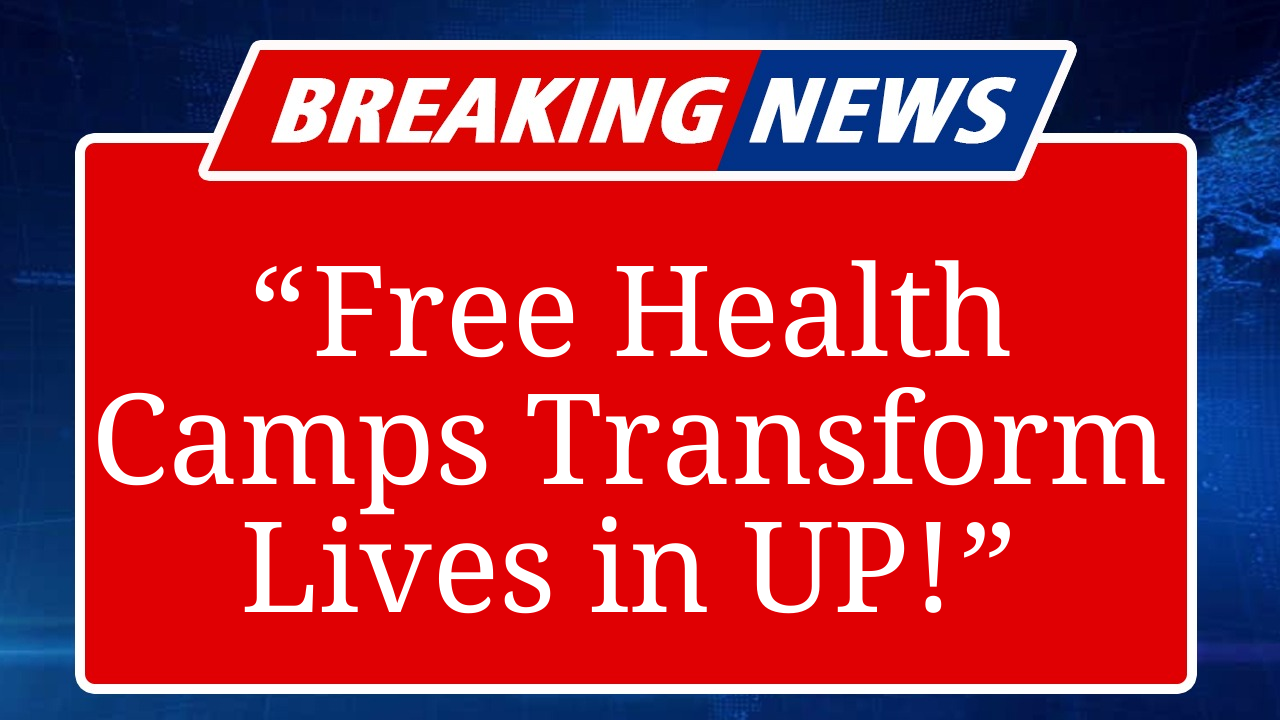“Uttar Pradesh’s free health checkup camps are transforming lives by providing accessible medical screenings to millions, particularly in rural areas. These camps offer vital diagnostics, early detection of chronic diseases, and health awareness, ensuring quality healthcare reaches underserved communities. Supported by government initiatives, they aim to improve public health outcomes across the state.”
Uttar Pradesh’s Mission to Ensure Health for All
In a bid to make healthcare accessible to all, the Uttar Pradesh government has ramped up its efforts to conduct free health checkup camps across the state, targeting both rural and urban populations. These camps, part of the state’s broader “Health for All” initiative, have been instrumental in providing free medical screenings, consultations, and health education to millions, particularly those in underserved and remote areas.
Since the launch of these camps, the UP government has collaborated with local health authorities, NGOs, and private healthcare providers to bring comprehensive medical services to the doorstep of communities. The camps offer a range of diagnostic tests, including blood pressure monitoring, blood sugar tests, cholesterol screenings, and checks for diseases like diabetes, hypertension, and cardiovascular issues. Specialized screenings for cancers, such as cervical and breast cancer, are also prioritized, addressing the rising prevalence of non-communicable diseases in India.
In 2025 alone, over 500 health camps have been organized in districts like Prayagraj, Gorakhpur, and Varanasi, benefiting more than 1.2 million people, according to data from the Uttar Pradesh Health Department. For instance, a recent camp in Prayagraj’s Shaikh Sarwa village saw over 250 patients receiving free consultations and medicines, with yoga awareness sessions integrated to promote holistic well-being. Similarly, camps in Gorakhpur have focused on combating encephalitis, a persistent health challenge in the region, through awareness drives and early detection.
These camps are equipped with mobile medical vans, some capable of performing up to 23 biochemical blood tests, ensuring quick and accurate diagnoses. Senior doctors from government hospitals, alongside specialists from private institutions, volunteer their services, making expert care accessible to those who cannot afford private healthcare. The Amar Ujala Foundation, a key partner in these initiatives, has organized 241 camps this year, benefiting over 60,000 people with free medicines and expert advice.
A significant focus of these camps is preventive healthcare. By emphasizing early detection, the camps aim to reduce the burden of chronic diseases, which account for 17% of deaths in India, as per recent health statistics. For example, identifying high blood pressure or elevated blood sugar levels early has helped prevent complications like heart disease and diabetes in many patients. Health education sessions, covering topics like healthy eating, exercise, and stress management, are also integral to these camps, empowering communities to adopt healthier lifestyles.
The camps are particularly impactful in rural areas, where access to healthcare facilities is limited. In districts like Karchana and Bamrauli, mobile medical units have reached remote villages, offering services like ECG, ultrasound, and blood tests free of charge. These efforts align with the state’s commitment to the Sustainable Development Goal (SDG) 3: Good Health and Well-Being, ensuring no one is left behind.
The UP government has also integrated technology to streamline these initiatives. Online platforms like Meddco provide real-time information about upcoming health camps, enabling people to locate and attend camps near them. Additionally, the camps facilitate enrollment in schemes like the Chief Minister’s Comprehensive Health Insurance Scheme, ensuring long-term healthcare access for the underprivileged.
Despite their success, challenges remain. Limited awareness in some remote areas and logistical issues in reaching isolated communities pose hurdles. However, the state is addressing these by increasing the frequency of camps and partnering with local leaders to spread awareness. Plans are underway to organize 1,000 more camps by the end of 2026, with a target to screen 5 million residents.
The impact of these camps is evident in the stories of beneficiaries. In Varanasi, a 45-year-old farmer was diagnosed with early-stage hypertension during a camp and received timely medication, preventing a potential stroke. In Gorakhpur, a young mother benefited from a cervical cancer screening, which detected precancerous cells, allowing for early intervention. These stories underscore the life-changing potential of accessible healthcare.
Disclaimer: This article is based on recent news reports, official statements from the Uttar Pradesh Health Department, and information from credible sources like The Times of India, The Hindu, and CSRBox. The data presented is accurate as of September 2025. Readers are advised to verify details with local health authorities for the latest camp schedules and services.

